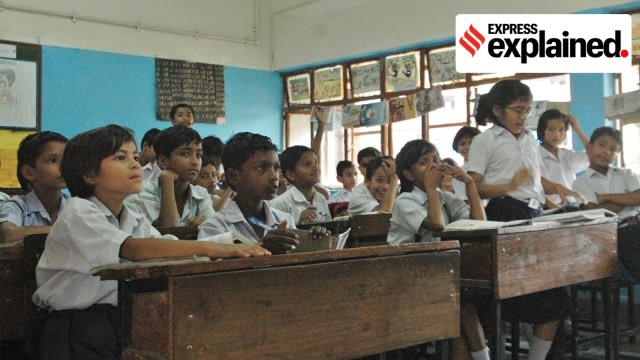The ‘No-Detention’ Policy and Its Evolution

- 24 Dec 2024
In News:
The ‘no-detention’ policy was a significant part of India’s education reforms under the Right to Education (RTE) Act of 2009. This policy aimed to prevent the detention or expulsion of students until the completion of elementary education (Classes 1-8), with a focus on reducing dropout rates and ensuring every child receives at least basic education. However, the policy has been contentious, with arguments both for and against its implementation.
What was the ‘No-Detention’ Policy and Why Was It Introduced?
The RTE Act (2009) made education free and compulsory for children aged 6 to 14, under Article 21A of the Constitution. Section 16 of the Act specifically prohibited the detention or expulsion of students in elementary education (Classes 1-8). The rationale was to prevent the demotivation and fear of failure that might cause children to drop out of school, especially those from marginalized backgrounds. By promoting automatic progression through grades, the policy aimed to ensure that no child was left behind due to academic struggles.
Key to this system was Continuous and Comprehensive Evaluation (CCE), which assessed students on a holistic basis, beyond just formal exams, encouraging learning through regular feedback and assessments.
Amendments to the RTE Act (2017 and 2019)
In 2017, a Bill was introduced to amend the RTE Act, following concerns about the effectiveness of the ‘no-detention’ policy. The amended policy allowed for regular exams in Classes 5 and 8. If students failed, they would be given a re-examination within two months. If they still did not meet promotion criteria, detention could be enforced. This amendment empowered the Centre and states to decide whether to detain students in these grades.
The amendment came after criticism of the original policy for promoting students without sufficient learning progress. States like Madhya Pradesh and Punjab argued that no-detention was leading to poor academic performance, and called for a return to the traditional system of promoting students based on examination results.
Arguments for and Against the No-Detention Policy
Arguments for No-Detention:
- Reduced Dropout Rates: The policy helped ensure students, especially from disadvantaged backgrounds, continued in school without the fear of failure, leading to a drop in dropout rates.
- Holistic Development: It encouraged a child-centric learning approach where students were assessed on their overall development rather than just exam performance.
- Social Inclusivity: By promoting students regardless of performance, it was hoped that education would be more inclusive, preventing marginalization of students from lower socio-economic backgrounds.
Arguments Against No-Detention:
- Decline in Learning Outcomes: The policy led to a lack of motivation for students to perform academically. Without the accountability of exams, many students became less serious about their studies.
- Low Teacher Accountability: With automatic promotion, teachers had less incentive to ensure quality learning, leading to an overall dip in teaching standards.
- Impact on Educational Standards: Data indicated a decline in learning levels in government schools, as students were passed through the system without mastering the required skills.
In 2015, the Central Advisory Board of Education (CABE) conducted a study suggesting that more flexibility was needed in the policy, allowing schools to retain students who were significantly behind. However, there were differing views within the committee. Some members argued that detention had no proven benefits, and that the real issue was the poor quality of the education system itself.
In 2016, the TSR Subramanian Committee on the New Education Policy suggested continuing the no-detention policy until Class 5, citing evidence of reduced dropout rates and increased enrollment. However, other states pushed for scrapping it due to concerns over declining educational standards.
The Shift Toward Scrapping the No-Detention Policy
By 2019, the RTE Act was amended to give states the discretion to hold back students in Classes 5 and 8, if they failed to meet the promotion criteria. This change came after state feedback that the no-detention policy was having adverse effects on learning outcomes and teacher accountability.
In 2024, the Ministry of Education took further steps to formalize this shift by introducing new rules under the RTE Act Amendment. Students failing to meet the promotion criteria in Classes 5 and 8 will be given additional instruction and an opportunity for a re-examination. If they still fail, they can be detained, with specialized guidance provided to help them catch up.
Which States Continue or Scrapped the No-Detention Policy?
The decision to maintain or scrap the policy varies across states and union territories:
- States Retaining No-Detention Policy: Andhra Pradesh, Arunachal Pradesh, Goa, Karnataka, Kerala, Maharashtra, Odisha, Telangana, Uttar Pradesh, among others, continue to implement the no-detention policy, citing its role in minimizing dropouts and promoting inclusivity.
- States That Have Scrapped the Policy: Delhi, Punjab, Madhya Pradesh, Rajasthan, West Bengal, and Gujarat have already discarded the policy, opting for examinations and re-examinations in Classes 5 and 8 to ensure better academic accountability.
Why the Controversy?
The debate over the no-detention policy hinges on balancing academic accountability with social inclusivity. Supporters argue that it ensures children from marginalized communities receive their full elementary education, while opponents point to the decline in learning standards, especially in government schools, as a major issue.
In summary, while the no-detention policy was introduced with the noble aim of reducing school dropouts and ensuring every child completed at least elementary education, its effectiveness has been questioned due to concerns over declining learning outcomes. The recent changes represent a shift towards better accountability and quality in education, while still ensuring that children receive additional support before being detained.
